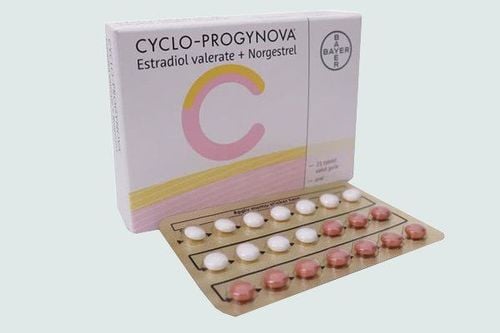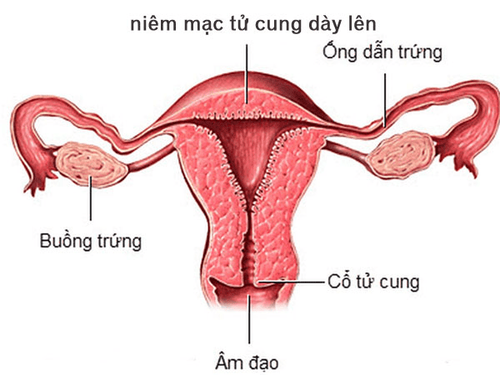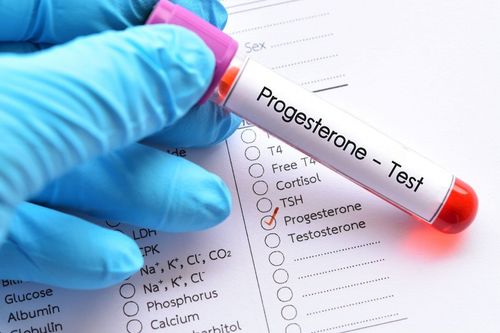This article was written under the professional guidance of doctors at the Center for Women's Health and Reproductive Support, Vinmec International General Hospital.
1. Overview of hemorrhagic ovarian cyst
1.1. What is a hemorrhagic ovarian cyst?
A hemorrhagic ovarian cyst is a condition in which small blood vessel tissues rupture during ovulation, causing extreme bleeding and pain in the lower abdomen.
This is one of the most dangerous complications of ovarian cysts and can occur when the cyst ruptures. Ovarian cyst rupture is considered the leading dangerous complication of this disease. Patients may suffer from acute anemia and life-threatening if not treated promptly.
We need to distinguish hemorrhagic ovarian cysts from physiological bleeding when women ovulate monthly. Hemorrhagic ovarian cysts often automatically heal and transform into secretory cysts, providing necessary hormones for the female body.
1.2. Causes
The larger the ovarian cyst, the higher the risk of rupture and bleeding, causing hemorrhagic ovarian cysts. Ovarian cysts contain a large amount of fluid, have a fragile shell, and are easily damaged by external impacts, including rough sex, heavy labor, or strong impacts on the lower abdomen, which can all lead to cyst rupture.

1.3. Symptoms
Ovarian cysts often do not show obvious symptoms and are easily confused with other gynecological diseases such as menstrual disorders, pelvic inflammatory disease, cervical ectropion, etc. However, some common symptoms of ovarian cysts include:
A often dull pain appears in the lower abdomen on the side of the cyst
Pain during menstruation.
Vaginal burning pain accompanied by light bleeding, blood leaking from the vagina.
Sudden and severe lower abdominal pain, feeling like being stabbed in the abdomen, cold, pale skin, and even fainting if the cyst ruptures.
2. Is hemorrhagic ovarian cysts dangerous?
Is hemorrhagic ovarian cysts dangerous? This is a question of many women. The answer is yes, the disease can lead to complications if not detected and treated promptly, such as:
- Infection due to cyst rupture: When the cyst ruptures, the fluid inside spills into the abdomen, causing secondary infection, and infection and can lead to pelvic peritonitis. In particular, if the cyst contains mucus when it ruptures, the fluid can stick to surrounding organs.
- Ovarian necrosis: Small ovarian cysts with long stalks have a high risk of torsion. If not intervened promptly, this condition can lead to ovarian necrosis, requiring surgery to remove one ovary.
- Infertility: When an ovarian cyst hemorrhages, if not treated promptly and effectively, it can negatively affect a woman's fertility, even leading to infertility.

3. Treatment
Although ovarian cysts are usually not dangerous, complications of ruptured cysts in some cases of hemorrhagic ovarian cysts can cause serious consequences, even threatening the patient's life. When detecting signs of hemorrhagic ovarian cysts, patients need to:
- Use pain relievers: When the pain is not too severe, regular pain relievers can provide temporary pain relief. However, pain relievers cannot replace the disease’s treatments and should not be abused.
- Apply other pain relief methods such as warm compresses.
- Treatment of cysts: In addition to following the doctor's treatment regimen, women can use additional herbs and vitamins to support the treatment of ovarian cysts, helping to reduce cyst bleeding. Note that the use of herbs and vitamins needs to be monitored for a certain time.
4. Prevention
When a tumor is detected, the patient needs to treat the tumor according to the doctor's regimen and check-ups on schedule to prevent ovarian cyst hemorrhage.
Ovarian cysts can be hereditary in the family. If a person has a relative with the disease, the risk of ovarian cysts will be higher. Therefore, women need to be vigilant and proactive in regular health check-ups to detect the disease and treat it promptly, thereby preventing the risk of cyst hemorrhage
To sum up, hemorrhagic ovarian cysts are dangerous complications of ovarian cysts, which occur when small blood vessels rupture during ovulation, causing women to bleed heavily and have pain in the lower abdomen. Because ovarian cysts can cause dangerous complications, to prevent them, women need to follow a regular health check-up schedule to detect the disease early and treat it promptly.
At Vinmec Nha Trang International General Hospital, there is a BASIC GYNECOLOGICAL SCREENING AND EXAMINATION COMBO, which helps detect infectious diseases early for timely treatment. For consultation and to register for an appointment, please visit the website for support.
To arrange an appointment, please call HOTLINE or make your reservation directly HERE. You may also download the MyVinmec app to schedule appointments faster and manage your reservations more conveniently.
To arrange an appointment, please call HOTLINE or make your reservation directly HERE. You may also download the MyVinmec app to schedule appointments faster and manage your reservations more conveniently.








